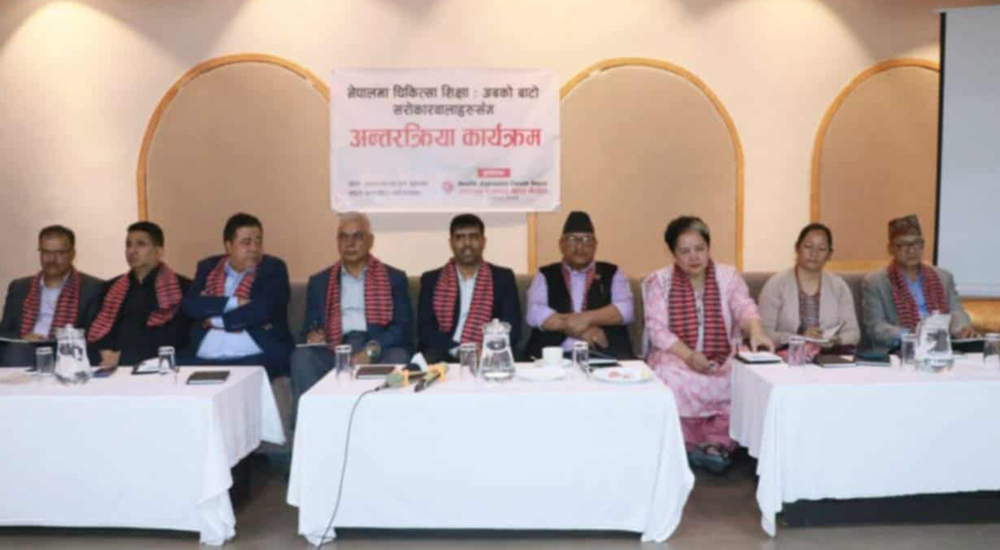
Experts Stress Restructuring of Medical Education Commission
Experts have stressed the need to restructure the Medical Education Commission. Speaking at an interaction program titled “Nepal Medical Education: The Way Forward,” organized by the Health Journalists Forum Nepal, experts highlighted the importance of reforming the commission.
Ministry’s Perspective
Shiv Kumar Sapkota, spokesperson for the Ministry of Education, Science, and Technology, stated that preparations are underway to review the commission with a focus on human resources and quality education.
He suggested allowing students who fail the Nepal Medical Council licensing exam to work based on their academic training.
Nursing Colleges Approval
Amar Bahadur Thapa, Chairperson of the Education, Health, and Information Technology Committee of the House of Representatives, said that nursing colleges that have completed the required process should be granted approval to operate widely.
He criticized the government for affiliating medical colleges without proper monitoring and shared that the committee is preparing to inspect health institutions across the country.
He added, “With the support of health experts, we are visiting every health facility to understand their situation and problems. We will present that report to Parliament.”
Thapa also stated that public and private medical colleges should not be treated the same, emphasizing that public medical colleges should be non-profit while private ones should be profit-oriented.
Quality of Medical Graduates
According to Thapa, the top performers in the medical licensing exam are those who studied in Nepal. “Nepal excels in medical education. Doctors trained in China, India, and Bangladesh often fail the licensing exam, while those trained in Nepal pass,” he said.
Parliamentary Members’ Views
MP Lila Devi Limbu stressed the need to focus on quality education once existing flaws in medical education are addressed.
MP Prof. Chanda Karki said the health system reflects the state of the country and emphasized opening medical colleges based on regional equality.
She remarked that while infrastructure is strong, curriculum and faculty need improvement, and both public and private colleges should be regulated.
MP Ishwari Gharti called for a review of the effectiveness of government investment in medical education and for forming a common understanding of the way forward.
Academic and Institutional Suggestions
Nepal Medical Council Chair Dr. Chop Lal Bhusal supported restructuring the commission, saying it could become a hub for medical education.
Kathmandu University Prof. Manoj Humagain stressed the need for clear criteria to determine seat numbers and fees, and suggested that universities should regain control over entrance examinations.
Medical Education Commission Director Prof. Sujan Babu Marahatta presented a working paper on the current status and future plans of the commission, stating that the focus is on systematizing medical education.
He said the commission is preparing standards to ensure quality in its programs and is working on developing curriculum benchmarks and improving examination systems across universities.
Nepal Health Professional Council Chair Subodh Kumar Sharma expressed concern over declining results in council exams and emphasized the importance of quality in medical education.
National Academy of Medical Sciences Vice-Chancellor Prof. Bhupendra Basnet noted that Nepal has made significant progress in health education. “We now have an adequate number of medical personnel. Last year alone, three new government medical colleges opened. Now, the focus should be on quality,” he said.
Private Sector Concerns
Private Medical and Dental Colleges Association Chair Dr. Gyanendra Man Singh Karki pointed out the shortage of medical faculty in Nepal and called for better coordination between the commission and the Ministry of Health.
Association Vice-Chair Dr. Buddhi Man Shrestha said private institutions invest not only to earn profits but also to serve, and called on the state to protect private sector investments in the medical field.
Association Treasurer Shanta Raj Batas suggested that if Nepal could bring back 5,000 students who passed under Nepal’s system in India, the country could benefit from both internal income and medical tourism. “Nepal has better infrastructure than India and is safer. Many of our trained students are working abroad,” he said.
Conference

